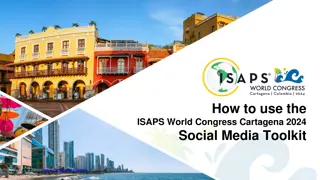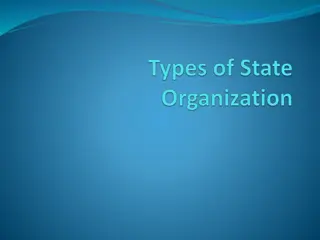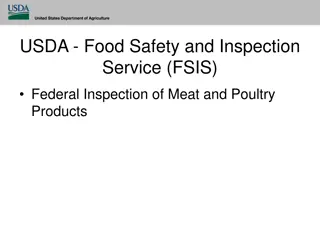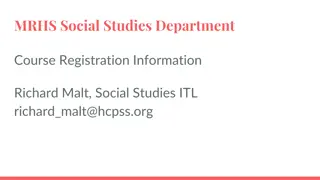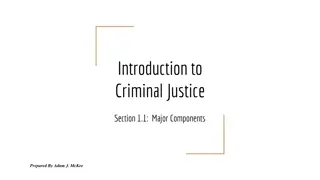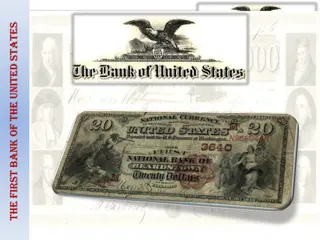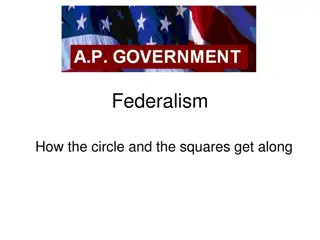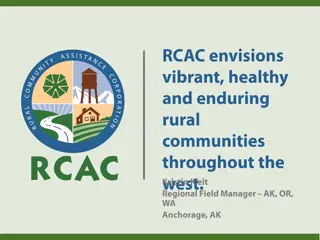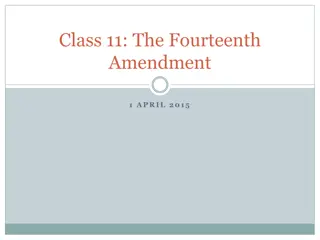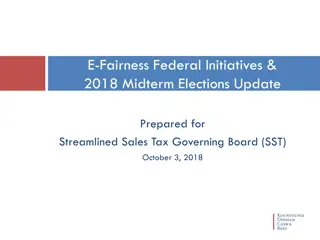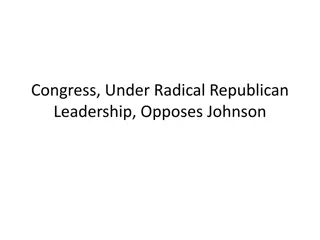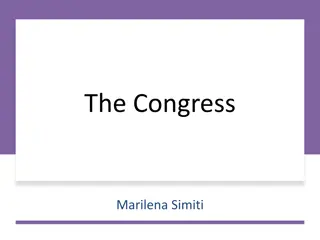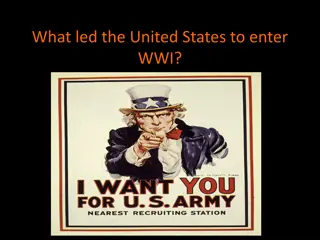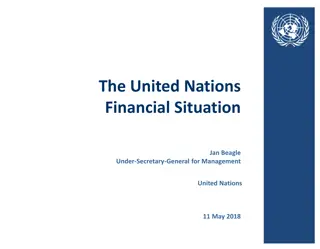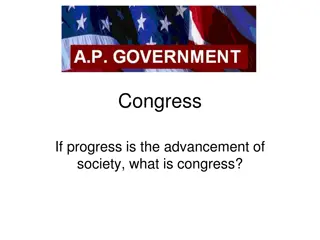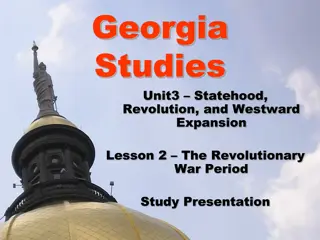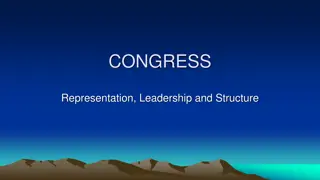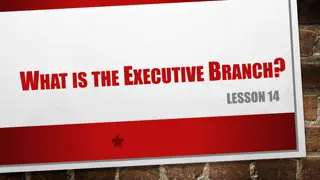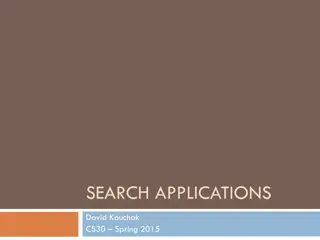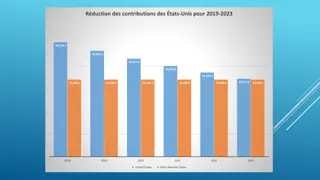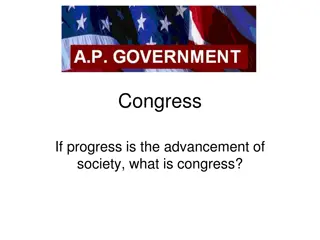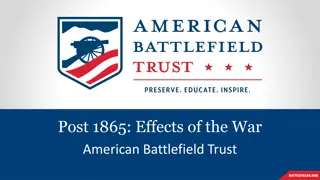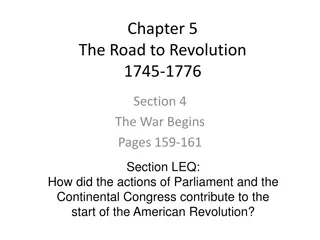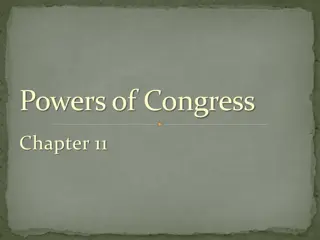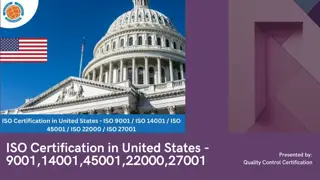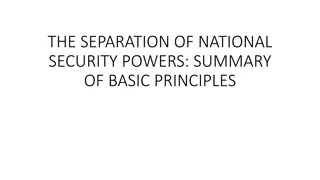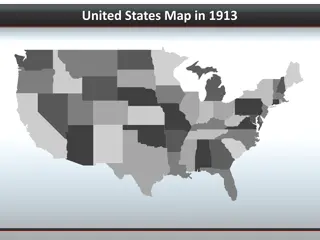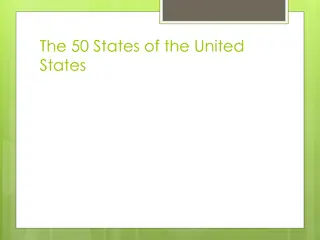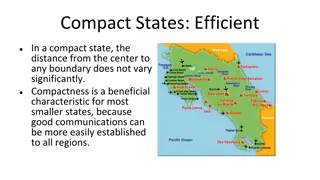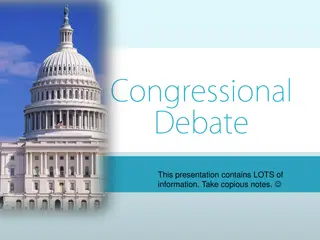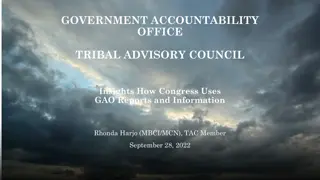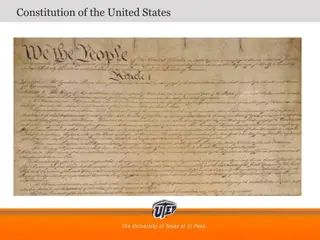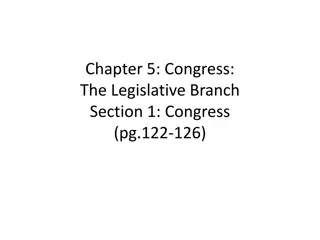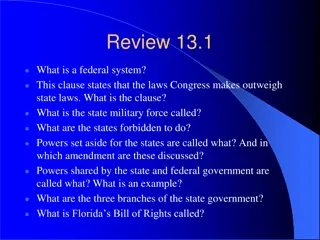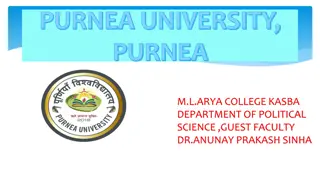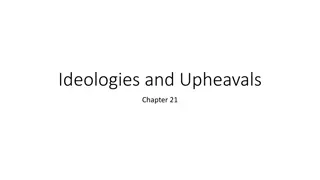Maximizing Social Media Engagement for ISAPS World Congress Cartagena 2024
Discover ways to promote the ISAPS World Congress 2024 effectively on social media platforms such as Facebook, Twitter, Instagram, YouTube, and LinkedIn. Enhance your engagement by personalizing your account with cover images, photo frames, GIFs, and logo images available for download. Join the glob
0 views • 6 slides
Overview of Unitary, Confederal, and Federal States
Unitary, confederal, and federal states each have distinct characteristics regarding the distribution of power between central and subnational governments. Unitary states have centralized governance, while devolved states like the UK grant autonomy to subnational entities. Decentralized states trans
0 views • 22 slides
United States Food Safety and Inspection Service: Ensuring Meat and Poultry Products' Safety
The United States Department of Agriculture's Food Safety and Inspection Service (FSIS) oversees the federal inspection of meat and poultry products to ensure their safety for human consumption. The statutes governing this process include the Federal Meat Inspection Act, the Poultry Products Inspect
0 views • 23 slides
Social Studies Course Offerings at MRHS
Explore the Social Studies department's course offerings at MRHS, including United States History for 9th grade, Honors United States History, and United States History GT. Each course provides a unique learning experience focusing on key historical themes, critical analysis of texts, and developmen
0 views • 4 slides
Overview of Criminal Justice System Components in the United States
The criminal justice system in the United States comprises various systems at state and federal levels. It consists of major components - Police, Courts, Corrections - bound by the Rule of Law and the Constitution. The Courts interpret laws and uphold civil liberties, with remedies available for vio
0 views • 28 slides
Balkan International Autism Congress - BIAC2 Summer 2021 in Turkey
The Balkan International Autism Congress - BIAC2 Summer 2021 will be held online via live streaming from Thursday, 01st to Sunday, 04th of July 2021. This congress, organized by World Autism Organisation, features 36 speakers from 17 countries across 4 continents, presenting a range of topics relate
0 views • 5 slides
Exploring the Historical Significance of the Eucharistic Congress, 1932
This resource aims to help students assess the historical significance of the Eucharistic Congress held in 1932. It focuses on fostering critical thinking skills and uses an enquiry-focused approach to clarify learning objectives. The content includes discussion on the context of Ireland and the Cat
0 views • 42 slides
The First Bank of the United States: A Historical Overview
The First Bank of the United States played a crucial role as a national issue, highlighting the connection between financial power and control. This historical institution, established during George Washington's presidency, shaped the early economic landscape of the United States. As students reflec
0 views • 14 slides
Understanding Federalism in the United States
Federalism in the United States involves the relationship between the federal government and state governments, with terms such as delegated powers, reserved powers, concurrent powers, and the Elastic Clause playing key roles. The aftermath of events like Hurricane Katrina and policies such as No Ch
0 views • 30 slides
Discover the Beauty of Western United States
Explore the diverse landscapes and enchanting destinations of the Western United States, from the rugged wilderness of Alaska to the sunny beaches of California. Immerse yourself in the stunning natural beauty of Arizona, the scenic wonders of Colorado, and the tropical paradise of Hawaii. These sta
0 views • 13 slides
Understanding the Fourteenth Amendment to the U.S. Constitution
The Fourteenth Amendment, ratified in 1868 after the Civil War, ensures citizenship for all persons born or naturalized in the United States. It prohibits states from making laws that violate citizens' privileges or deprive individuals of life, liberty, or property without due process. The amendment
0 views • 16 slides
Update on E-Fairness Federal Initiatives & 2018 Midterm Elections
The Supreme Court decision in South Dakota v. Wayfair has paved the way for states to require out-of-state sellers to collect and remit sales tax. Various federal legislative bills have been introduced in the 115th Congress regarding e-fairness. The Marketplace Fairness Act, S.976, aimed to establis
0 views • 36 slides
Radical Republican Congress and Reconstruction Efforts
The Radical Republican-led Congress opposed President Johnson's lenient Reconstruction plans after the Civil War. They rejected Lincoln's approach, which led to the implementation of harsh Black Codes in the South. Congress pushed through laws like the Civil Rights Act of 1866 and the Freedman's Bur
0 views • 8 slides
Insights into the Power of the American Congress
The American Congress, established by the Constitution, holds significant power due to its role in overseeing the budget, introducing legislation, confirming nominations, and declaring war. Its authority to tax and spend gives it control over the nation's finances. The presidential system further en
0 views • 75 slides
Why the United States Entered World War I
The United States initially remained neutral during World War I, but various factors led to its eventual entry into the conflict. Growing anti-German sentiments, impact of the war on the American economy, incidents like the sinking of the Lusitania, and the revelation of the Zimmerman Telegram all p
0 views • 18 slides
United Nations Financial Situation Analysis
This analysis provides insights into the financial status of the United Nations as of various dates in 2016, 2017, and 2018. It includes data on assessments, payments, outstanding dues, cash on hand, and the number of member states paying in full. Charts visualize the regular budget assessment statu
0 views • 24 slides
Understanding the Role and Structure of Congress in the US Government
Congress, as the legislative branch of the US government, plays a vital role in advancing society by making laws and representing the interests of the American people. Founded with intentions to balance powers and represent states of different sizes, Congress is divided into the House of Representat
0 views • 32 slides
Georgia's Role in the American Revolution
Explore Georgia's involvement in the Revolutionary War period, including its absence in the First Continental Congress, representation in the Second Continental Congress, the role of Georgia's Second Provincial Congress, and the challenges faced during the Revolutionary War fighting in Georgia again
0 views • 10 slides
Understanding the Structure and Challenges of the US Congress
The US Congress, established as the first branch of government, embodies the principle of popular sovereignty. However, challenges such as increasing reliance on deficit spending, failure to pass key legislation, and low public approval due to processes like filibustering have raised questions about
0 views • 20 slides
Understanding the Executive Branch and Presidential Selection in the United States
The Executive Branch in the United States, outlined in Article II of the Constitution, carries out and enforces laws passed by Congress. The President serves as the head of this branch, with a balance of power carefully established by the framers to prevent dictatorial control. The selection process
0 views • 13 slides
Solving N-Queens and Missionaries & Cannibals Problems Using Search Algorithms
Explore the application of search algorithms in solving classic problems like the N-Queens problem and the Missionaries & Cannibals dilemma. Understand the concept of states, start states, goals, transitions, and goal states in these puzzles. Dive into the strategies of adding states to a to-visit l
0 views • 8 slides
Financial Overview of Reductions and Contributions in the United States (2019-2023)
The data highlights reductions in the contributions of the United States from 2019 to 2023, along with the total quota income of other member states. It also includes projected expenses and budgetary reductions applied annually, categorized into personnel and non-personnel. The information provides
0 views • 5 slides
Understanding the Role and Function of the U.S. Congress
U.S. Congress plays a crucial role in advancing society by making laws, overseeing the budget, and conducting investigations. This article explores the structure, powers, and leadership of Congress, detailing the differences between the House and Senate and explaining the Constitutional and evolutio
0 views • 31 slides
Reconstruction Period after the Civil War: Plans and Challenges
The Reconstruction period after the Civil War in the United States saw various plans proposed by President Abraham Lincoln, Republicans in Congress, President Andrew Johnson, and Radical Republicans. These plans aimed to rebuild the country and bring the Southern states back into the Union, addressi
0 views • 7 slides
The Road to Revolution: Actions of Parliament and Continental Congress
The events leading to the American Revolution, including the actions of Parliament and the Continental Congress, are highlighted in this chapter. It covers the issues facing the 2nd Continental Congress, the differences between Patriots and Loyalists, the failure of the Olive Branch Petition, and th
0 views • 21 slides
Powers of Congress: Legislative, Implied, and Congressional Powers Explained
Explore the various powers of Congress, including legislative powers such as enumerated and implied powers, as well as congressional powers like regulating commerce and funding the government through taxes. Discover how Congress exercises authority granted by the Constitution to fulfill its roles an
0 views • 23 slides
Powers of Congress and Constitutional Framework
The powers of Congress in the United States are shaped and limited by two fundamental facts: limited government and a federal system. The Constitution grants Congress powers through expressed, implied, and inherent powers. The Congressional view of power varies between strict constructionists and li
0 views • 25 slides
ISO Certification in United States 9001,14001,45001,22000,27001
We are here to provide your business with ISO certifications that matter. Quality Control Certification guides United States companies to easily meet ISO Certification in United States 9001,14001,45001,22000,27001 standards.\n\nVisit: \/\/qccertifi
1 views • 7 slides
Understanding the Separation of National Security Powers
The separation of national security powers involves the formalist view where Congress makes laws, the Executive executes them, and the courts interpret them. The branches' powers are often blurred, with Congress able to delegate lawmaking power to the Executive. The Executive can also acquire custom
0 views • 8 slides
Women's Suffrage Progress in the United States
Explore the historical timeline of women's suffrage in the United States from 1913 onwards, highlighting when different states granted women the right to vote. The provided images visually depict the states granting voting rights for women over the years, including those that did so before and after
0 views • 5 slides
Interesting Facts About the 50 States of the United States
Explore key information about the 50 states of the United States, including their abbreviations, statehood dates, capitals, state flowers and birds, nicknames, and mottos. Learn fascinating details about each state from Alabama to Delaware and beyond.
0 views • 51 slides
Characteristics of Different State Shapes Explained
Compact states have efficient communication due to their balanced shape, while prorupted states extend for access or disruption. Elongated states face potential isolation issues, and fragmented states are problematic with territorial pieces separated. Perforated states, like South Africa, completely
0 views • 17 slides
Understanding Congressional Debate in the United States
This presentation delves into the nuances of Congressional Debate, a format modeled after the United States Congress where students debate proposed federal legislation. It covers key aspects such as types of legislation, vocabulary, roles like Senators/Representatives and Presiding Officer, parliame
0 views • 49 slides
Understanding How Congress Utilizes GAO Reports for Oversight
The Government Accountability Office (GAO) serves as the investigative arm of Congress, supporting its constitutional responsibilities by enhancing federal government performance and accountability. This insight provides a detailed look into how Congress uses GAO reports and information for oversigh
0 views • 13 slides
Conflict of Interest Disclosure for EAPC 2024 Congress
This disclosure statement outlines the conflict of interest policy for speakers at the EAPC 2024 Congress. Speakers are required to disclose any affiliations or financial interests that may potentially influence their presentations. The purpose of the disclosure is to inform attendees so they can ev
0 views • 4 slides
Influence of the Iroquois Confederacy on the United States Constitution
The United States Constitution has roots in the Iroquois Confederacy's Great Law of Peace, shaping principles of governance like division of powers, impeachment processes, and restrictions on holding multiple offices. This influence is evident in the structure of branches, war powers clauses, and ba
0 views • 20 slides
Understanding Congress: The Legislative Branch in Action
The legislative branch is embodied in Congress, where representatives elected by the people translate popular will into law. With the House of Representatives and the Senate comprising Congress, discussions explore the dynamics of representation, member demographics, apportionment, and the distinct
0 views • 11 slides
Overview of State Government and State Legislatures in Florida
A federal system is a political framework where power is divided between a central government and individual states. In this system, laws created by Congress take precedence over state laws. The supremacy clause enforces this hierarchy. States are prohibited from actions like declaring war or mintin
0 views • 12 slides
Overview of the United States Congress and Political System
The United States Congress is the bicameral legislature of the federal government, composed of the House of Representatives and the Senate. Representatives are elected every two years based on districts, while senators serve six-year terms elected at-large in their states. Congress consists of 535 m
0 views • 6 slides
Ideologies and Upheavals: Congress of Vienna and Impact
The Congress of Vienna, a gathering of key European powers, aimed to establish lasting peace after Napoleon's defeat. Key agreements included territorial compensation, restoration of monarchs, and the formation of the Holy Alliance. While successful in preventing major wars, the Congress lacked fore
0 views • 19 slides
